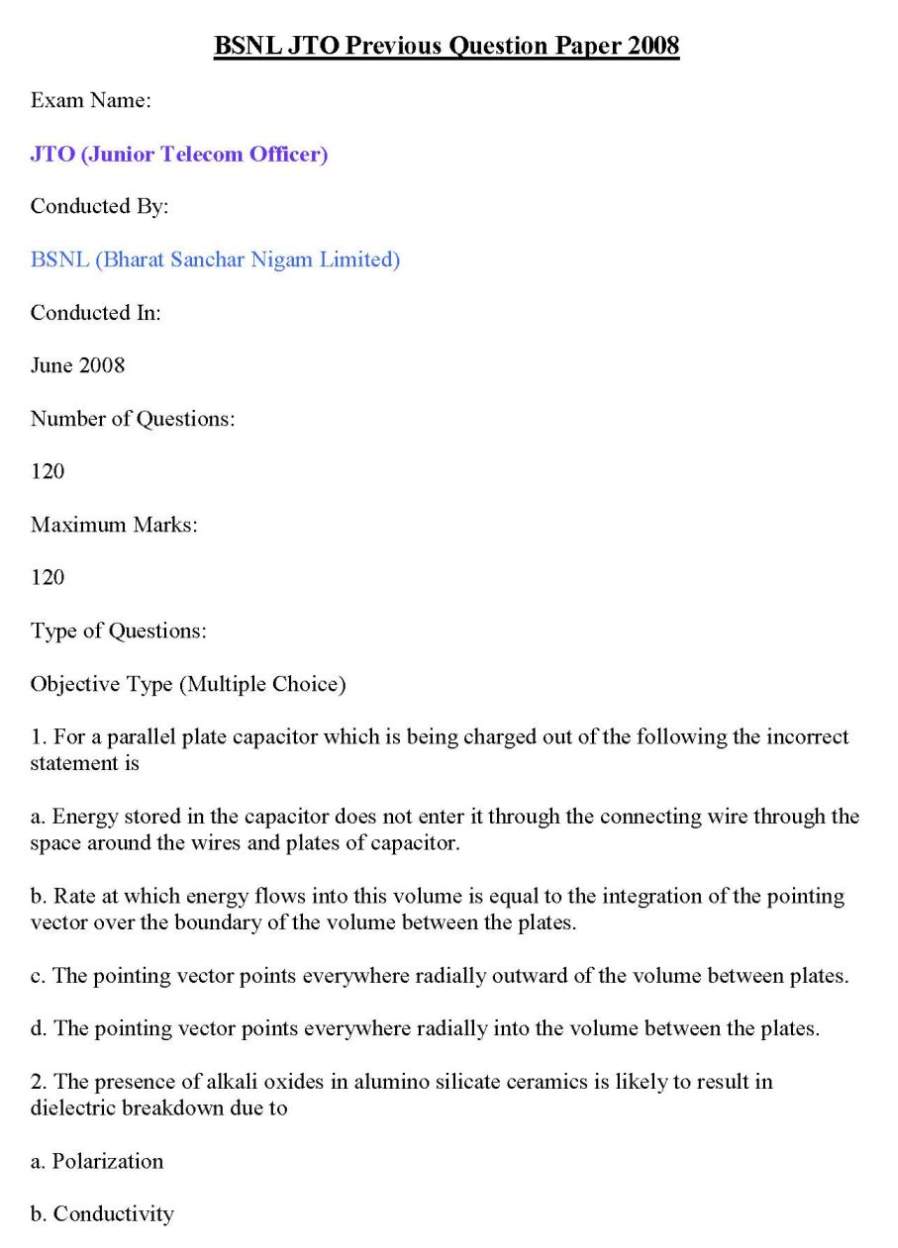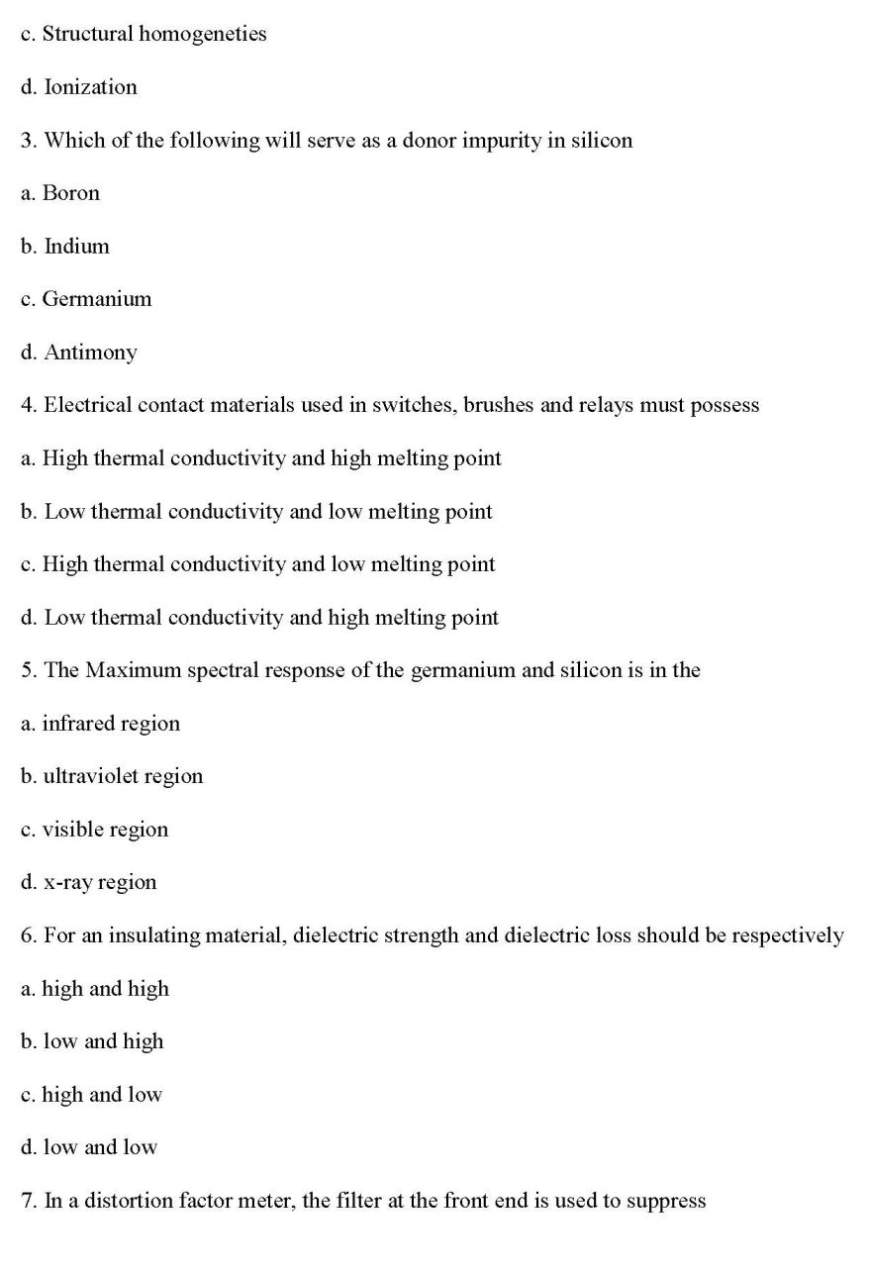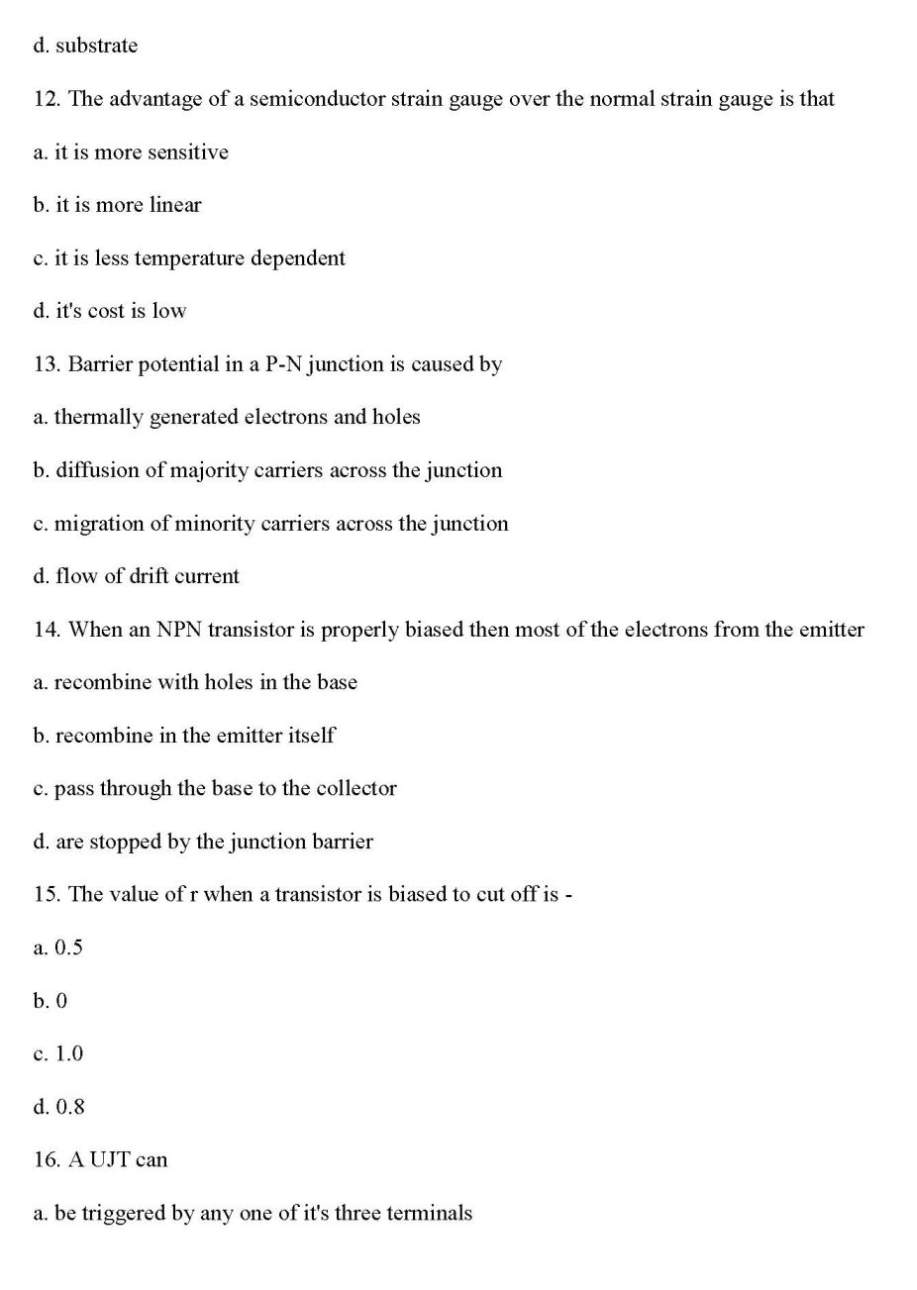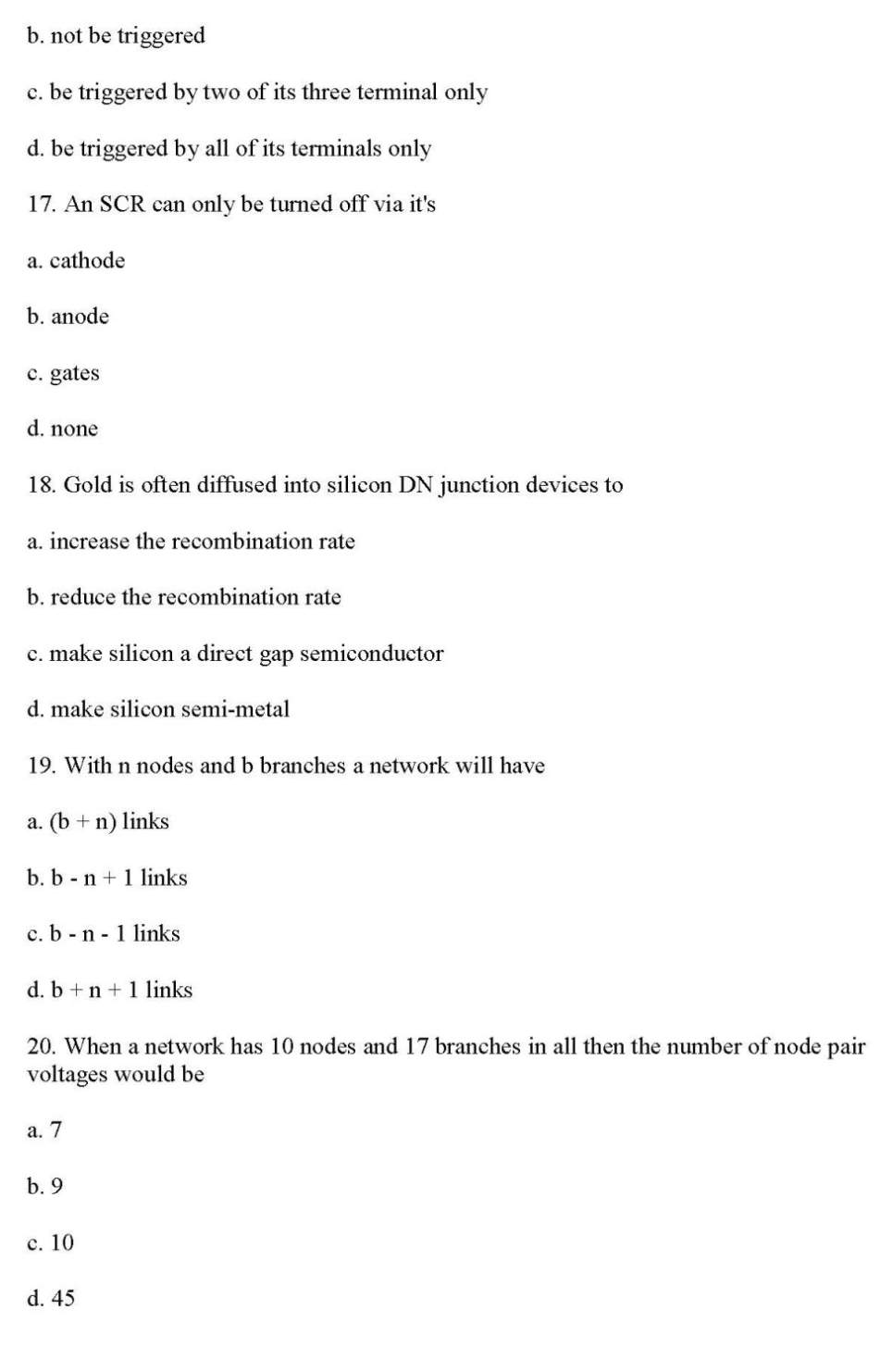|
#4
24th March 2015, 09:38 AM
| |||
| |||
| Re: Exam Pattern for BSNL JTO Exam
BSNL conducts the examination for Junior Telecom Officer (JTO) every year for the different circles. Paper Pattern for BSNL JTO Exam :- The examination will be of three hours duration with one question paper containing the following three sections: For JTOs(Telecom) Section-I : Engineering Stream : 50 questions Section-II : Engineering Stream : 50 questions Section-III : General Ability test : 20 questions For JTOs(Electrical) Section-I : Electrical Engineering Stream:50 questions Section-II : Electrical Engineering Stream: 50 questions Section-III : General Awareness: 20 questions The question paper will be fully objective type with multiple options Syllabus for BSNL JTO Exam:- SECTION-I 1.Materials and Components - Structure and properties of Electronic Engineering materials, Conductors, Semiconductors and Insulators, Magnetic, Ferroelectric, Piezoelectric, Ceramic, Optical and Superconducting materials. Passive components and characteristics, Resistors, Capacitors and Inductors; ferrites, Quartz crystal, Ceramic resonators, Electromagnetic and Electromechanical components. 2.Physical Electronics, Electron Devices and ICs - Electrons and holes in Semiconductors, Carrier Statistics, Mechanics of current flow in a semi-conductor, Hall effect; Junction theory; Different types of diodes and their characteristics; Bipolar Junction transistor, Field effect transistors, Power switching devices like SCRs, CTOs, power MOSFETs; Basics of ICs-bipolar, MOS and CMOS types; basics of Opto Electronics. 3.Network theory = Network analysis techniques: Network theorem, trans cient and steady state sinusoidal response, Transmission criteria: delay and rise time Elmore’s and other definition, effect of cascading. Elements of network synthesis. 4.Electromagnetic Theory - Transmission lines: basic theory, standing waves, matching applications, microstrip lines; Elements of antenna theory. 5.Elecronic Measurements and instrumentation Basic concepts, standards and error analysis; Measurements of basic electrical quantities and parameters; Electronic measuring instruments an d their principles of working: analog and digital, comparison, Characteristics, applications. Transducers; Electronic measurements of non – electrical quantities like temperature, Pressure, h umidity etc. Basics of telemetry for industrial use 6.Power Electronics - Power semiconductor devices, Thyristor, Power transistor, MOSFETS, Characteristics and operation. AC to DC convertors; 1 – Phase and 3 – p hase DC to DC Convertors AC regulators. Thyristor controlled reactors, switched capacitor n etworks. Inverters: Single – phase and 3 – Phase. Pulse width modulation. Sinusoidal modulation with uniform sampling. Switched mode power supplies. SECTION - II 1.Analog Electronic Circuits - Transistor biasing and stabilization, Small Signal analysis. Power amplifiers. Frequency response, Wide band techniques, Feedback amplifiers. Oscillators. Rectifiers and power supplies. Operational Amplifier, other linear integrated circuits and applications. Pulse shaping circuits and waveform generators. 2.Digital Electronic Circuits - Transistor as a switching element; Boolean algebra, simplification of Boolean functions, Karnaugh Map and applications, IC Logic gates and their characteristics; IC logic families; DTL, TTL, ECL, NMOS, PMOS and CMOS gates and their comparison; Combinational logic circuits; half adder, full adder; Digital Compartor; Multiplexer Demutliplexer, ROM and their applications. Flip-flops, R-S, J-K, D and T flip-flops; Different types of counters and registers; waveform generators, A/D and D/A convertors, Semiconductor memories. 3.Control systems - Transient and steady state response of control sys tems; Effect of feedback on stability and sensitivity, Root locus techniques; Frequency response analysis, Concepts of gain and phase margins; Constant-M and Constant-N Nichol’s Chart, Approximation of transient response from Constant-N Nichol’s Chart; Approximation of transient response from closed loop frequency response, design of Control systems, Compensators; Industrial controllers. 4.Communication systems - Basic information theory; Modulation and detection in analogue and digital systems; Sampling and data reconstruction, Quantization & Co ding; Time division and frequency division multiplexing; Equalisation, Optical communication; in free space & fibre optic; propagation of signals at HF, VHF, UHF and microwave frequency; Satellite communication. 5.Microwave Engineering - Microwave Tubes and solid state devices, Microwave generation and amplifiers, Waveguides and other Microwave Components and Circu its, Microstrip circuits, microwave antennas, Microwave Measurements, MASERS LASERS; Mi crowave propogation, Microwave Communication Systems-terrestrial and satellite based. 6.Computer Engineering - Number Systems; Data representation, Programming; Elements of a high level programming language PASCAL/C; use of basic data st ructures; Fundamentals of computer architecture processor design; Control unit design; Memory organization ; Personal computers and their typical uses. 7.Microprocessors - Microprocessor architecture – Instruction set and simple assembly language programming. Interfacing for memory and I/O. applications of Mic roprocessors in Telecommunications and power system. SECTION III General Ability Test - The candidates comprehension and understanding of General English shall be tested through simple exercises. Questions on knowledge of current events and of such matter of everyday observation and experience in their scientific aspe cts as may be expected of an educated person. Questions will also be included on events and devel opments in Telecommunications, History of India and Geography. These will be of a nature, which can be answered without special study by an educated person. BSNL JTO Question Paper      |